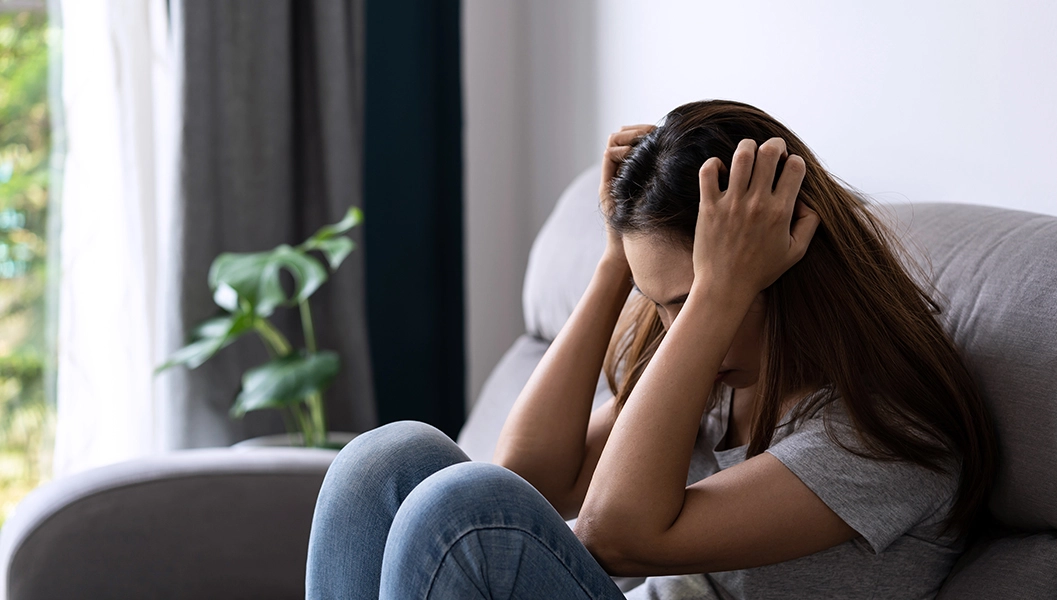What Is Depression? Causes, Signs & Proven Ways to Overcome It

According to the World Health Organization, about 280 million people suffer from depression around the world. Despite its prevalence, what depression is remains a mystery to many. The stigma around it prevents people from seeking help, recognizing its signs and understanding its causes.
Constant blues, lethargy, loss of interest or pleasure and impaired daily functioning- if you or someone you know exhibits these signs, it could be an indication of depression. But depression is something beyond feeling sad.
This blog addresses the key questions people have, like what depression is. Whether managing it yourself, supporting a loved one, or aiming to better understand mental health, you’ll find practical insights and guidance.
With resources like the Saalvio app, seeking mental health support has become far easier.
Saalvio bridges the gap between seeking support and accessing mental health services through its smart technology and tools. Let’s find out more!
What is Depression? Definition and Impact
Depression is a medically recognized mood disorder that sticks around, often for weeks or months. It impacts more than just your mood, focus, energy, motivation, and even your work performance and relationships.
If not adequately addressed, depression may turn into a psychopathology, starting to affect productivity and health.
It starts to manifest physically as chronic pain or fatigue, and emotionally, causing feelings of worthlessness or excessive guilt.
The good news is: depression is treatable.
With the right psychological approach, therapy, medication, and digital solutions like Saalvio, recovery and improved quality of life are inevitable.
What About Depression? Differentiating Sadness vs. Clinical Depression
Clinical depression is more than just a feeling of sadness. The Diagnostic and Statistical Manual of Mental Disorders (DSM-5) sets a criterion of at least 2 weeks of symptoms for a person to be diagnosed with depression.
These may include, but are not limited to:
- Loss of interest or pleasure in everyday activities
- Insomnia
- Eating disorders
- Lethargy
- Lack of concentration
- Lack of self-worth
Whereas sadness may be triggered by grief or a temporary spell of the blues. If you’re finding yourself checked out, overwhelmed, or emotionally numb, it’s time to reach out for support.
What Causes Depression? Addressing Biological, Genetic & Environmental Triggers
Depression is an outcome of several interconnected factors. What causes depression? It depends on an array of biological, genetic and environmental influences.
- Chemical imbalances in the brain: Imbalances in neurotransmitters like Serotonin and Dopamine are associated with depression.
- Genetic factors: It has been found that around 40 to 50 per cent of susceptibility to depression comes from family history.
- Environmental factors: Loss, illness, trauma or insomnia also contribute to the onset of depression.
Stanford Medicine found that genes and biology both contribute to the onset of depression and its progression.
What Are Signs of Depression? Key Emotional, Behavioural & Physical Indicators
To understand signs of depression, consider these key indicators:
- Persistent worry, irritability, numbness and sadness.
- Anhedonia– loss of pleasure, interest or hobbies in work and activities.
- Sleep issues like insomnia or hypersomnia.
- Changes in appetite, such as binge eating or not eating at all.
- Lethargy, difficulty concentrating and sluggishness.
- Indigestion and physical pain, such as recurrent headaches.
- In progressive cases, suicidal ideation or self-harm.
The DSM-5 sets out criteria for the diagnosis of clinical depression if these signs persist for over 2 weeks. However, early detection is critical for assessment and prognosis. You can explore our detailed blog on the signs of depression to understand them better.
What Does Depression Feel Like? Lived Experiences
“I wanted to stay in my room, locked and never interact. I used to cry a lot without any reason and felt like doing nothing. I even thought about ending my life.”
-Amanda, a depression fighter.
This is what Amanda had to say when she was asked, What does depression feel like?
- Depression can feel like a dense fog that affects every aspect of daily life.
- Daily tasks become challenging, and the world seems colourless, as if it has been drained of its vibrancy.
- People may struggle with persistent guilt or harsh self-criticism, and feelings of inadequacy often dominate.
- These emotional struggles often show up physically as fatigue, restlessness, or unexplained pain.
- Acknowledging these experiences without judgment is the first step in recovery, and it’s vital for developing self-compassion.
Why Am I Depressed? Spotting Your Triggers
If you are wondering, “Why am I depressed?” Your triggers may be highly individual:
- External stressors: Grief of losing a loved one, financial constraints, or strained relationships.
- Internal stressors: Perfectionism, pessimism, chronic anxiety, or persistent self-doubt.
- Everyday stressors: Lack of sleep, social isolation, and a sedentary lifestyle.
Biological, genetic and hormonal fluctuations should not be overlooked, and they may also exacerbate depression.
You can use a journal, chat with Saalvio’s Thrive AI, or use self-healing exercises, whichever best suits your workflow.
Once you spot your triggers, you can begin to personalize your coping strategies accordingly.
You might want to schedule time with a counsellor, engage in CBT, or set up calming routines.
Is Depression a Mental Illness? Explaining and Erasing Stigma
It’s a common question often asked, and the answer is: yes, it is. The American Psychiatric Association’s DSM-5 and ICD-11 classify depression as a mood disorder, recognizing it as a medical condition rather than a character flaw.
Taking it this way helps remove the stigma and makes it easier for people to consider therapy or medication without hesitation.
Is Depression Genetic? Effects of Heritability and Environment
As mentioned earlier, research supports the fact that depression may be carried in genes and runs in families.
Your genetic makeup does matter; however, daily choices like how you manage stress, prioritize sleep, and maintain your relationships play a huge role too.
Is depression genetic? The diathesis–stress model answers this question. It shows that having a genetic predisposition for depression doesn’t automatically mean you’ll experience it. You need some kind of trigger or stressor to initiate it. You don’t have power over your genes, but you do have power over your habits.
How to Help Someone With Depression? Providing Empathy and Support
Helping someone with depression relies on a number of pointers.
- Active listening: Before you react or jump to conclusions, listen deeply to the person and do not interrupt.
- Acknowledge their feelings: Empathize with the person and put yourself in their shoes. Say reaffirming sentences like “I can’t imagine what you are feeling, but know that I am here for you.”
- Refer and guide them to professional support: Encourage them to seek help from a mental health practitioner, whether through professional therapy or digital solutions like Saalvio’s Self Help Tools.
- Offer help in daily tasks: Try to help the person with household errands, meals and reminders.
- Care for yourself, too: Set healthy boundaries with the depressed person.
Consistent support and understanding are keys to a quick and smooth recovery.
How to Deal with Depression? Preparing a Coping Strategy
The critical question after getting a diagnosis of depression is, how to deal with depression? A blended coping plan works.
- Professional Support: Enrol in therapy, counselling sessions or guided online programs.
- Set up a self-care routine: Mindfulness meditation, walking and taking balanced meals help.
- Set goals: Divide your day into small, working tasks and set SMART goals to fulfill them.
- Use a Mood Tracking App: It will help in identifying mood trends.
- Social involvement: Chat with friends or join support groups.
- Healthy habits: Eat healthy, prioritize sleep and stay away from stressors as much as possible.
This is a holistic strategy that drives resilience and consistency in daily life. For more guidance, check out our blog on dealing with depression .
How to Overcome Depression? Wonders of Therapy and Tools
If you are concerned about overcoming depression, you need to consult a qualified mental health professional to develop a personalized treatment strategy. Proven methods such as therapy for depression can help you identify and restructure irrational thoughts, making them rational and manageable.
- Cognitive Behavioural Therapy (CBT) is an age-old yet effective technique. It helps you identify and restructure irrational thoughts, making them rational and manageable.
- Take it slow and steady. Re-engage with your routines and responsibilities, even if it’s a gradual process.
- Don’t overlook healthy sleep habits.
- Eat balanced meals
- Do regular physical activity.
- Use digital tools like journals, workbooks, mood tracking apps, and online support platforms.
These digital tools help you to monitor your progress and stay engaged in your recovery. You can also check out our blog on overcoming depression to learn more simple tips and helpful ways to cope with it.
How to Combat Depression? Heading Towards Recovery
Combating doesn’t have a one-size-fits-all approach.
You need proactive strategies:
- Maintain regular contact with your social network.
- Keep up with self-care routines, even if they’re simple.
- When symptoms get worse, have resources ready, such as a trusted mental health app like Saalvio, emergency contacts and a support system.
- Use digital platforms like online chat services, mental health apps, and even AI-driven check-ins.
Bottom Line
Knowing what depression is and what causes it plays a big role in spotting the signs early. When you use proven, research-backed ways to manage, cope with, and work through depression, it can really make a difference in how you feel emotionally and mentally.
With resources like mental health platforms, mood tracking apps and AI-driven therapeutic consultations, accessing counselling is not a hassle anymore.
Saalvio- Your Mental Wellness Just One Click Away
Talk to experts, get therapy, track your mood, use self-help tools and avail 10+ exercises, all from the comfort of your home.
Explore personalized self-care by downloading the Saalvio App, booking a session or talking to mental health experts.
Get Help Now!
FAQs
1. How to get out of depression?
Setting out micro-goals, reaching out for help and setting realistic goals can help manage depression. Schedule an appointment with a mental health expert and track your mood.
2. How is depression diagnosed?
Once you know what depression is, your mental health expert will assess you. They might use a 9-item self-report tool called the PHQ-9 questionnaire and follow up with an assessment and interview.
3. What are the main kinds of depression?
The main types of depression are:
- Major depressive disorder
- Seasonal affective disorder
- Persistent depressive disorder
- Atypical depression
4. What are the most effective treatment options for depression?
Widely used and effective treatment options include:
- CBT (Cognitive Behavioural Therapy)
- Antidepressants
Neuromodulators for treatment-resistant depression.
5. Can physical health issues trigger depression?
Yes, chronic illnesses like autoimmune diseases or cancer can develop depression. However, diseases like diabetes, thyroid, cardiac problems and chronic pain can also initiate symptoms of depression.

